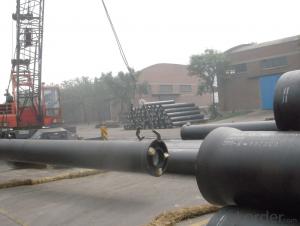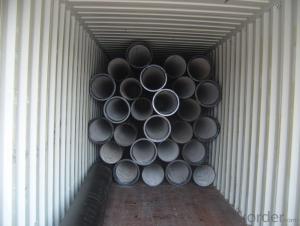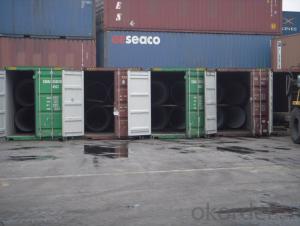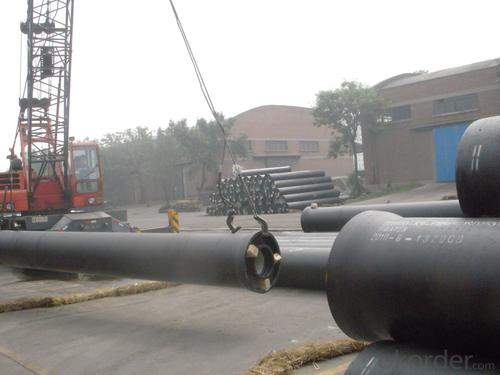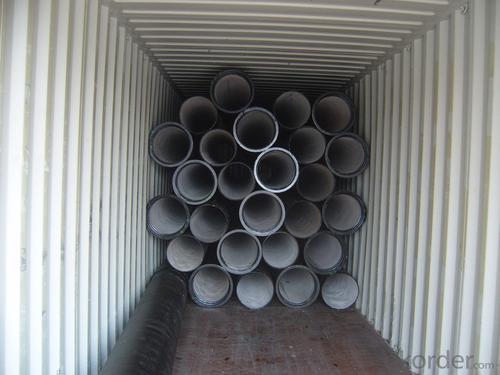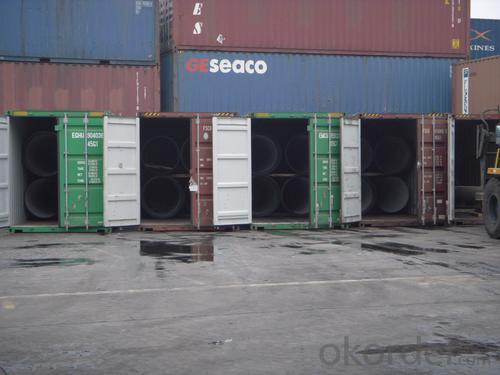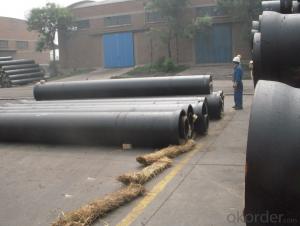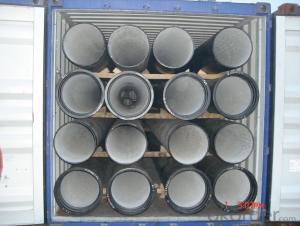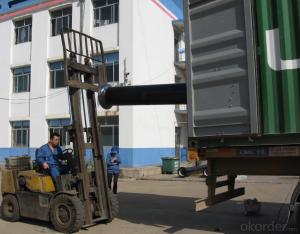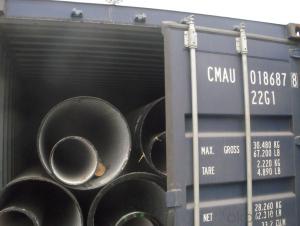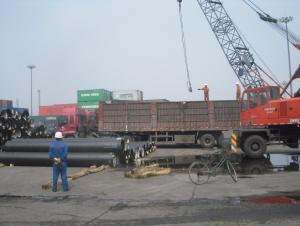DUCTILE IRON PIPES K8 DN350
- Loading Port:
- China Main Port
- Payment Terms:
- TT OR LC
- Min Order Qty:
- -
- Supply Capability:
- -
OKorder Service Pledge
OKorder Financial Service
You Might Also Like
Ductile Iron Cast Pipe is without any defects compare with tradition casting tech, which has many advantages particularly as follow:
(1) High density. In the "vertical upward casting" process, the melt iron of centre liquid column in center crystallizer is continuously feeding for volume shrinkage caused by condensation tube at outer circumference , which lead to be free of shrinkage porosity.
(2) High purity. When melt iron pouring, the mixed impurities such as gas, dross, sand grain which are lighter than melt iron could be eliminated at furnace mouth, its impossible to enter into the crystallizer through the channel, so the melt iron into the crystallizer is very pure.
(3) Strength with toughness. The cooling speed provided by continuous crystallizer is 30 times than sand casting and 5 times than centrifugal casting, and doesn't produce white iron, the eutectic cell volume of continuous cast iron is one eighth to one tenth compare with traditional cast iron. The density of graphite nodule in ductile iron can reach 300-700 pcs/mm2. Therefore, all reason above improve the strength and toughness of continuous cast iron.
(4) Free machining. The high speed cooling make the hardening phase (such as boride, steadite) not appear like reticular, massive or thick, but diffuse like fish bone and pane in shape, moreover, there are tiny graphite flakes inlaid hardening phase. It's free machining in BrinellHardness the range of 250-300HB. However, the Brinell Hardness of 250 is top limit to common metal materials.
(5) Uniform composition of tube wall. The convection mixing of liquid column caused by marching type drawing in crystallizer make the composition of tube wall well-distributed, and concentration gradient very little.
(6) High productivity. To the wall thickness of tube under 10mm, the speed of continuous casting is 1 meter/min, to the wall thickness of tube under 20mm, the speed of continuous casting is 0.5 meter/min, which is high efficiency that centrifugal or other casting tech couldn't reach.
- Q: Are ductile iron pipes suitable for power plant cooling systems?
- Yes, ductile iron pipes are suitable for power plant cooling systems. Ductile iron pipes offer excellent strength, durability, and corrosion resistance, making them ideal for handling high temperature and high-pressure water flows commonly found in power plant cooling systems. Additionally, their flexibility and ease of installation make them a cost-effective choice for such applications.
- Q: How are ductile iron pipes protected against external corrosion?
- Ductile iron pipes are protected against external corrosion through a combination of manufacturing processes and external coatings. The first line of defense is the inherent corrosion resistance of ductile iron itself. The iron is treated with a special alloying element, typically magnesium, which forms a protective layer on the surface of the pipe. This layer acts as a barrier against corrosion and helps to extend the lifespan of the pipe. In addition to the corrosion-resistant properties of the iron, ductile iron pipes are also externally coated with protective materials. One common method is to apply a layer of asphaltic or bituminous coating to the pipe's surface. This coating acts as a barrier against moisture and corrosive substances in the soil, preventing them from coming into contact with the iron. It also provides a layer of insulation, reducing the likelihood of galvanic corrosion. Another method of external corrosion protection is the use of fusion-bonded epoxy (FBE) coatings. FBE is a thermosetting resin that is applied to the surface of the pipe and then heat-cured to form a strong and durable coating. This coating provides excellent resistance against corrosion, abrasion, and impact, making it a popular choice for ductile iron pipes in harsh environments. In some cases, additional protective measures such as cathodic protection systems may be employed. These systems use electric currents to counteract the corrosion process by supplying electrons to the pipe's surface. This helps to prevent corrosion from occurring, especially in areas where the coating may have been damaged or compromised. Regular maintenance and inspection are also crucial in ensuring the long-term protection of ductile iron pipes against external corrosion. This includes periodic cleaning, repair of any coating damages, and monitoring the integrity of the protective layers. Overall, the combination of the inherent corrosion resistance of ductile iron, external coatings, and maintenance practices ensures that ductile iron pipes are well-protected against external corrosion, allowing them to have a longer lifespan and deliver reliable performance in various applications.
- Q: Is it better to use steel tubes or ductile iron pipes for water supply?
- Flexible seamless steel pipe is good toughness, good processing, better than ductile iron corrosion resistance, the price is slightly higher;
- Q: How is ductile iron pipe installed?
- Ductile iron pipe is typically installed using a process called trenchless technology or open-cut method. In the trenchless technology approach, a hole is drilled into the ground and the ductile iron pipe is then pushed or pulled into the hole using hydraulic jacks or winches. This method minimizes disruptions to the surrounding environment and reduces the need for extensive excavation. In the open-cut method, a trench is excavated to the required depth and width for the ductile iron pipe. The trench is then prepared by removing any debris or obstructions and ensuring a stable base. The pipe is then lowered into the trench and aligned properly using laser or surveying equipment. After the pipe is positioned, joints are connected using a rubber gasket or mechanical joint. The joints are typically sealed to prevent leakage. Backfill material is then carefully placed around the pipe, ensuring proper compaction to provide stability and support. The backfill is typically done in layers to avoid excessive settlement. Once the installation is complete, the pipe is tested for leaks and pressure to ensure its integrity. This may involve hydrostatic testing, where the pipe is filled with water and monitored for any signs of leakage or pressure loss. Overall, the installation of ductile iron pipe requires careful planning, excavation, alignment, joint connection, backfilling, and testing. It is essential to follow industry standards and guidelines to ensure a successful and reliable installation that meets the required specifications.
- Q: Can ductile iron pipes be used in areas with high levels of hydrogen sulfide gas and corrosion potential?
- Before making a decision, it is important to take certain factors into consideration when considering the use of ductile iron pipes in areas with high levels of hydrogen sulfide gas and corrosion potential. Ductile iron pipes display a strong resistance to corrosion, particularly when they are adequately protected with external coatings and linings. This characteristic makes them appropriate for environments with moderate levels of hydrogen sulfide gas and corrosion potential. Nevertheless, in areas with exceedingly high levels of hydrogen sulfide gas and severe corrosion potential, alternative materials such as corrosion-resistant alloys or specially coated pipes may be more suitable. To determine the suitability of ductile iron pipes, conducting a thorough evaluation of the specific conditions in the area is crucial. Factors such as the concentration of hydrogen sulfide gas, the presence of other corrosive elements or chemicals, and the overall corrosiveness of the environment should be taken into account. Furthermore, consulting the local regulations and industry standards is essential to ensure compliance and safety. In conclusion, while ductile iron pipes can withstand moderate levels of hydrogen sulfide gas and corrosion potential, it is necessary to conduct a comprehensive assessment of the specific conditions. In areas with high levels of hydrogen sulfide gas and severe corrosion potential, consulting with experts in the field and considering alternative materials may be required.
- Q: Are ductile iron pipes resistant to chemicals?
- Generally, ductile iron pipes exhibit resistance to chemicals. Ductile iron, a variety of cast iron, is fortified with small amounts of magnesium to enhance its strength and ductility. This alloying process effectively heightens its ability to withstand corrosion and chemical attack. Ductile iron pipes have found extensive use in multiple applications, such as water supply, wastewater treatment, and industrial piping systems, where they may encounter a range of chemicals. Nevertheless, it is crucial to acknowledge that the resistance of ductile iron pipes to chemicals can vary based on the specific type and concentration of the chemical in question. Thus, it is advisable to seek guidance from the manufacturer or a qualified engineer to ascertain the suitability of ductile iron pipes for a particular chemical application.
- Q: How can the cast iron pipe of the ductile iron pipe be repaired?
- First of all, to see whether the manufacturers do elbow pressure did not reach, if it is. That can only be replaced, if not, with a cast iron electrode welding repair.By the way, ductile iron can only be welded and not welded.
- Q: What does ductile iron pipe "ND200" mean?
- The nominal pipe diameter and the inner diameter and the outer diameter were not equal, for example: the nominal diameter of 100MM seamless steel pipe 102*5, 108*5 several, 108 for the outer diameter of pipes, 5 said that the wall thickness of the tube, therefore, the pipe diameter (108-5-5 = 98MM), but it is not completely equal to pipe diameter minus two times the wall thickness difference, it can be said that the nominal diameter is close to the diameter, but not equal to the diameter of a pipe diameter specifications on the design drawings, so we use the nominal diameter, the purpose is to determine according to the nominal diameter pipe, flange and gasket structure and size connecting dimensions, nominal diameter is represented by the symbol DN, if the diameter of said in the design drawings, piping specifications should also make the table, show that the nominal diameter of a pipe wall thickness.
- Q: Can ductile iron pipes be used for underground cooling water systems?
- Ductile iron pipes are suitable for underground cooling water systems. They are renowned for their durability, strength, and resistance to corrosion, making them ideal for various applications, including underground installations. In cooling water systems, where pipes encounter water and potentially harsh environments, ductile iron pipes offer a dependable and enduring solution. Their capacity to withstand high pressure and temperature variations also guarantees the efficient and secure operation of the cooling water system. Moreover, ductile iron pipes are frequently favored for underground installations because they are easy to install, require minimal maintenance, and are cost-effective.
- Q: Do ductile iron pipes require special maintenance?
- Yes, ductile iron pipes do require special maintenance. While ductile iron is known for its strength and durability, it is still susceptible to certain forms of corrosion. Regular maintenance is necessary to prevent corrosion and prolong the lifespan of the pipes. This maintenance typically includes periodic inspections to check for any signs of corrosion or damage, as well as cleaning and protective coating applications. Additionally, proper handling and installation techniques should be followed to ensure the integrity of the pipes. Regular maintenance and adherence to industry best practices can help prevent leaks, breaks, and other issues, ultimately saving time and money in the long run.
Send your message to us
DUCTILE IRON PIPES K8 DN350
- Loading Port:
- China Main Port
- Payment Terms:
- TT OR LC
- Min Order Qty:
- -
- Supply Capability:
- -
OKorder Service Pledge
OKorder Financial Service
Similar products
Hot products
Hot Searches
Related keywords
